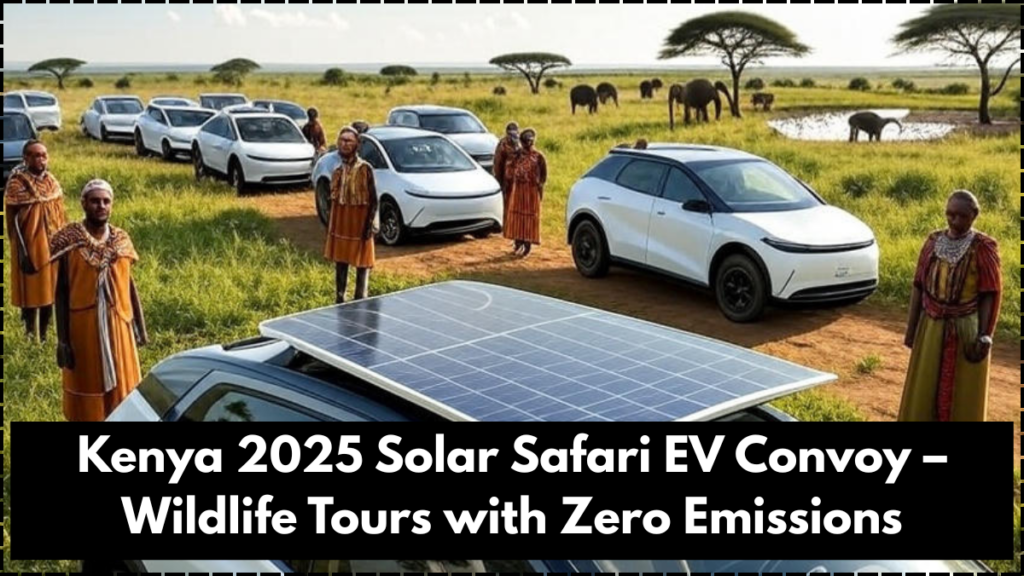Tourism in Kenya is changing fast, and 2025 will mark a new milestone with the launch of the Solar Safari EV Kenya. This innovative convoy promises a way to explore wildlife reserves with zero emissions. For decades, safaris were linked to noisy diesel jeeps that disturbed the natural peace of the savannah. Now, with the arrival of fully electric convoys powered by renewable solar energy, travelers can enjoy Electric Wildlife Tours that protect the environment while offering an even closer connection to nature.
The Solar Safari EV Kenya is more than just a tourism program. It’s a statement that Africa is embracing sustainable technology without sacrificing its cultural and ecological heritage. Visitors in 2025 will not only witness breathtaking wildlife but also become part of a green revolution that redefines eco-travel.

How the Solar Safari EV Convoy Works
The convoy is designed to run exclusively on solar-charged electric vehicles. Charging hubs are being installed near major game parks like Maasai Mara, Amboseli, and Tsavo. These stations are powered by solar panels and supported by local microgrids to ensure uninterrupted service even in rural areas.
Each vehicle is quiet, producing no fumes or vibrations. This makes it possible for travelers to experience Electric Wildlife Tours with less intrusion on animal behavior. Herds of elephants, prides of lions, and flocks of birds remain undisturbed, creating a more authentic safari experience.
Key features include:
- Solar-powered charging points located along convoy routes
- Noise-free rides for a peaceful environment
- Air-conditioned comfort with panoramic viewing windows
- Affordable ticketing options for both locals and international tourists
Benefits of Solar Safari EV Kenya
The Solar Safari EV Kenya initiative brings benefits beyond tourism. It has positive impacts on conservation, local communities, and the overall economy. Some of the strongest advantages are:
- Environmental Protection: Reduction of carbon emissions and less pollution in fragile ecosystems.
- Tourist Experience: Closer wildlife encounters thanks to quieter vehicles.
- Economic Growth: New job opportunities for local guides, drivers, and technicians.
- Education: Raising awareness about renewable energy in rural communities.
To show how it compares with traditional safari options, here’s a quick overview:
| Safari Option | Fuel Source | Environmental Impact | Tourist Experience | Cost (2025 estimate) |
|---|---|---|---|---|
| Diesel Jeep Safari | Diesel | High emissions, noise | Limited due to disturbance | $$ |
| Hybrid Safari Vehicle | Diesel + Battery | Reduced emissions | Moderate improvement | $$ |
| Solar Safari EV Kenya | Solar-powered EV | Zero emissions, quiet | Close, immersive wildlife | $$$ (premium eco) |
This table shows how the Solar Safari EV Kenya clearly stands out as the best sustainable option for Electric Wildlife Tours in 2025.
Preparing for the 2025 Launch
Kenya’s tourism board, along with private investors and environmental organizations, is preparing for the official launch of the Solar Safari EV Kenya in mid-2025. Pilot runs have already proven successful, drawing strong interest from eco-conscious travelers across Europe, Asia, and North America.
Villages near popular safari routes are also being equipped with solar microgrids, ensuring that the project benefits both travelers and locals. Farmers and residents can tap into the same energy systems, improving rural electrification rates. This dual-purpose strategy highlights why Kenya is becoming a leader in sustainable tourism.
Conclusion
The Solar Safari EV Kenya is more than just a futuristic idea—it’s the future of responsible travel. By combining innovation with respect for wildlife, Kenya is setting a new global standard. For tourists, these Electric Wildlife Tours are a once-in-a-lifetime chance to enjoy the magic of the savannah without harming it. For Kenya, it’s proof that sustainability and economic growth can move forward together.
FAQs
What makes the Solar Safari EV Kenya different from traditional safaris?
The convoy runs on solar-powered electric vehicles that produce zero emissions and no noise, giving tourists closer wildlife encounters.
How are the Electric Wildlife Tours powered in remote areas?
Charging stations are equipped with solar panels and backed by microgrids to ensure continuous energy supply.
Will the Solar Safari EV Kenya be affordable for local tourists?
Yes, while international visitors may pay a premium, special packages and discounts are planned for Kenyan residents.
When will the first Solar Safari EV Kenya convoys start operating?
The official launch is scheduled for mid-2025, with bookings expected to open earlier in the year.
Click here to learn more
Sachin is a dedicated writer specializing in education, career, and recruitment topics, delivering clear and actionable insights to empower readers.
